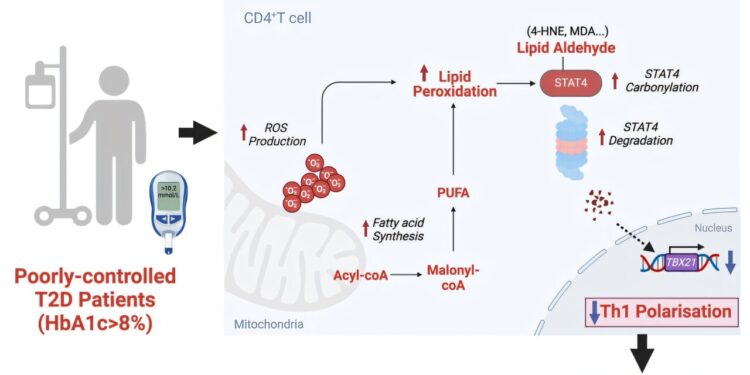Credit: Cellular metabolism (2024). DOI: 10.1016/j.cmet.2024.10.004
A research team from the LKS Faculty of Medicine, University of Hong Kong (HKUMed) has identified a mechanistic link between high blood glucose levels and weakened immunity against viral infections in patients with type 2 diabetes ( DT2). The collaborative research highlights the increased susceptibility of T2DM patients to more frequent and severe viral infections, highlighting the importance of maintaining optimal blood glucose levels as a vital public health measure.
The research results, published in Cellular metabolismprovide valuable information on the mechanisms underlying these health risks.
In Hong Kong, T2DM is a significant public health problem, affecting approximately 1 in 10 adults. Despite advances in pharmacotherapy in the management of T2DM, a significant number of patients still struggle to achieve optimal glycemic control. Notably, patients with poorly controlled T2DM (PC-T2D) are particularly vulnerable and face more frequent and severe health risks.
The human body generally has a strong defense against viral infections, mainly through the rapid production of antiviral T cells. Specifically, when a virus is detected, T Helper 1 (Th1) cells are generated to facilitate an inflammatory response necessary to eradicate infected cells.
However, during the recent COVID-19 pandemic, it was observed that T2D patients with COVID-19 had a three-fold higher mortality risk than those without T2D, and the majority of deaths among patients T2D occurred in those whose diabetes was poorly controlled.
The HKUMed research team conducted a study to uncover the reasons for this increased vulnerability and explore strategies to improve outcomes for patients with T2D.
Search results
Led by Professor Heidi Ling Guangsheng from the School of Biomedical Sciences, Dr Paul Lee Chi-Ho and Professor Kathryn Tan Choon-Beng from the Department of Medicine, School of Clinical Medicine at HKUMed, the research team discovered how high blood glucose levels were. in patients with PC-T2D resulted in a worse antiviral response.
The team conducted a comprehensive review of 40 blood samples from T2D patients at Queen Mary Hospital from 2022 to 2023, which revealed a notable 40% decrease in the functionality of Th1 cells derived from PC-patients. T2D, compared to those of healthy individuals. Fortunately, Th1 functionality was restored in patients with well-controlled blood glucose (WC-T2D), highlighting the importance of effective glycemic control to enhance antiviral immunity.
Further experiments using immune cell cultures and animal models demonstrated that high blood glucose levels impair CD4 metabolism.+T cells. This leads to the degradation of a key transcription factor necessary for their development into functional Th1 cells, thereby decreasing their ability to respond effectively to viruses and other pathogens. Additionally, this deficiency can trigger a chronic inflammatory response, further compromising the immune system and increasing the risk of various health problems.
Importance of research
The research team found that T2DM patients with better glycemic control do not experience the detrimental effects of T cell dysfunction, highlighting the importance of regular medication and strict adherence to treatment plans. By identifying glucose-mediated CD4 mechanisms+T cell dysfunction, this study paves the way for new treatment options to improve the immunity of T2DM patients.
“These research findings highlight the importance of keeping blood sugar levels under control. A strong immune system is crucial to ease the healthcare burden during viral pandemics and to protect lives,” remarked Professor Heidi Ling Guangsheng, the one of the corresponding authors of the study. .
“These findings are particularly relevant for patients with T2DM, who are at greater risk of experiencing severe symptoms of COVID-19 and have increased susceptibility to influenza and other respiratory infections,” said Dr. Paul Lee Chi-ho, also corresponding author.
“It is essential that patients with T2D better understand their glycemic control, learn about their glycated hemoglobin (HbA1c) levels, adhere to their medication regimen and maintain a healthy lifestyle. These measures are the most effective ways to control blood sugar levels and protect against comorbidities and life-threatening infections.
More information:
Victor Gray et al, Lipid peroxidation triggered by hyperglycemia destabilizes STAT4 and impairs Th1 antiviral responses in type 2 diabetes, Cellular metabolism (2024). DOI: 10.1016/j.cmet.2024.10.004
Provided by the University of Hong Kong
Quote: High blood sugar linked to weakened immunity in type 2 diabetes (December 17, 2024) retrieved December 17, 2024 from
This document is subject to copyright. Except for fair use for private study or research purposes, no part may be reproduced without written permission. The content is provided for informational purposes only.



